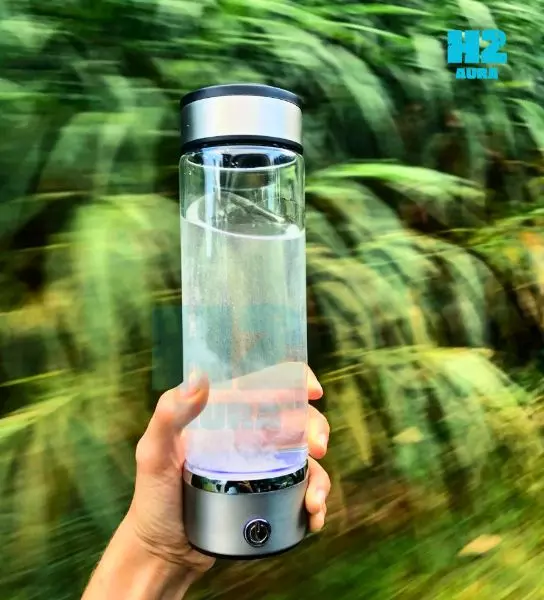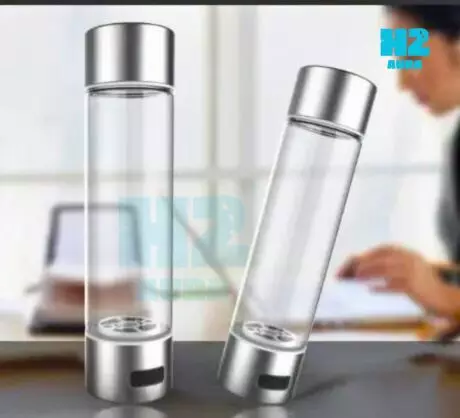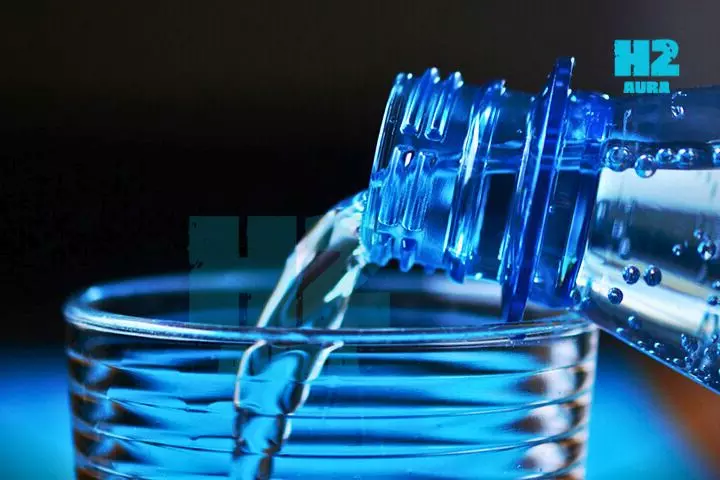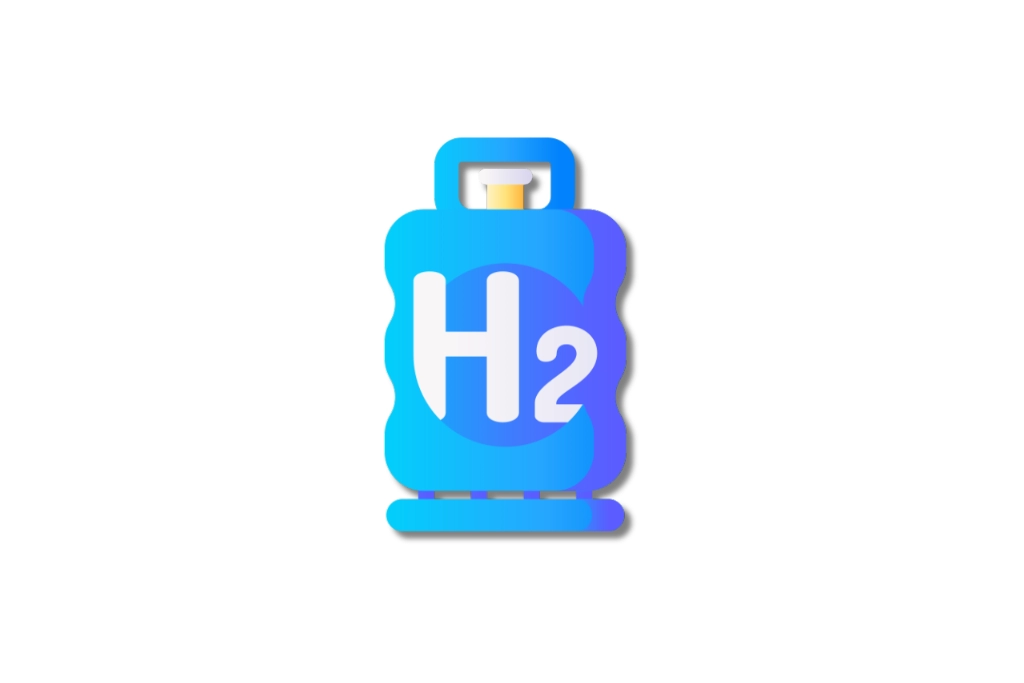As hydrogen water continues to bubble up in the wellness community, gaining momentum with each compelling testimonial and emerging study, it’s becoming a staple in the hydration routines of health aficionados worldwide. But with its rising popularity comes a wave of scrutiny—what are the real impacts of hydrogen water on health, and how do we sift through the hype to find the facts?
This comprehensive analysis delves into the world of hydrogen water, exploring its acclaimed benefits and potential drawbacks. By weaving together scientific research, consumer testimonials, and expert opinions, this article aims to equip you with a balanced perspective, enabling you to make an informed decision about integrating hydrogen water into your wellness regime.
Benefits of Hydrogen Water
Hydrogen water is praised for its antioxidant properties, which are among its most celebrated benefits. By introducing more molecular hydrogen into the body, this enhanced water is said to selectively neutralize harmful free radicals, potentially reducing oxidative stress and preventing cellular damage. This mechanism is pivotal in its promise to support overall health and wellness.
Another significant advantage of hydrogen water is its reported ability to boost energy levels. Consumers and some preliminary studies suggest that drinking hydrogen water can lead to increased energy, improved alertness, and better physical performance. This is believed to be due to the increased efficiency of generating energy in the mitochondria. However, more extensive research is required to confirm these effects.

Read More: Hydrogen improves exercise endurance in rats by promoting mitochondrial biogenesis
The overarching “hydrogen water benefits” extend into general well-being, including faster recovery from physical exertion and potentially improved metabolic profiles. These benefits contribute to why hydrogen water is good for you, especially if you’re looking for an adjunct to a healthy lifestyle that may enhance your physiological functions without the drawbacks of high-calorie or chemically laden beverages.
Read More: Does Hydrogen Water Help You Lose Weight?
These advantages underscore why hydrogen water has attracted significant interest within the health and wellness community. However, it is essential to approach these claims critically, examining both empirical evidence and anecdotal experiences to understand the full scope of what hydrogen water can offer.
Hydrogen Water Negative Side Effects
Although hydrogen water is praised for its potential health benefits, it’s also important to be aware of any possible negative side effects. The market’s enthusiasm often overshadows the need for rigorous scientific scrutiny, leading to gaps in understanding the full range of its impacts. Despite the general safety of hydrogen water, some studies and anecdotal reports have raised concerns worth noting.
One of the primary concerns is the lack of comprehensive long-term studies on the consumption of hydrogen water. Without extensive research, potential side effects, particularly those emerging from prolonged use, remain largely speculative but could include an imbalance in oxidative stress responses if antioxidant properties are overly potent. This could theoretically disturb normal cellular functions, although concrete evidence is scarce.

Additionally, “hydrogen water negative side effects” may also include minor gastrointestinal discomfort, such as bloating or indigestion, particularly in individuals with sensitive digestive systems. These side effects are not commonly reported but can occur when introducing any new element into a diet.
It is also crucial to highlight discrepancies in research findings. Some studies report significant health benefits, while others see minimal or no health effects, indicating a need for further research to establish a clearer understanding of hydrogen water’s true impact. This critical view encourages consumers to approach hydrogen water with a balanced perspective, recognizing both its potential benefits and its unexplored risks.
- Antioxidant Properties
- Energy Level Enhancement
- Supports Metabolic Health
- General Wellness Enhancement
- Limited Long-term Studies
- Varying Consumer Experiences
- Potential Digestive Discomfort
- Discrepancies in Research Findings
Scientific Perspective and Research
The scientific investigation into hydrogen water has yielded mixed but intriguing results. Several key studies have focused on understanding how molecular hydrogen in drinking water can benefit human health.
A notable study published in the Free Radical Research journal demonstrated that hydrogen water could improve markers of oxidative stress and boost antioxidant activity without adverse effects. These findings suggest a promising role for hydrogen water in combating oxidative damage linked to various chronic diseases.
Read More: Hydrogen as a Selective Antioxidant: A Review of Clinical and Experimental Studies
Another important aspect of the research delves into how hydrogen influences energy metabolism. A study from the Journal of Clinical Biochemistry and Nutrition found that participants who consumed hydrogen-rich water showed a significant increase in the production of the antioxidant glutathione, which plays a crucial role in energy metabolism and detoxification.
This highlights potential benefits for energy levels and recovery times, providing a scientific basis for some of the energy-enhancing claims made by proponents of hydrogen water.

Furthermore, research examining the therapeutic effects of hydrogen water on lifestyle diseases, such as diabetes and metabolic syndrome, has shown positive outcomes, including reduced cholesterol levels and improved glucose metabolism. These studies, while still in the early stages, suggest that hydrogen water may have broader applications in managing and potentially preventing certain health conditions.
The implications of these findings are significant, suggesting that hydrogen water could play a role in enhancing antioxidant defenses, supporting metabolic health, and reducing oxidative stress. However, the scientific community continues to call for more robust, long-term studies to fully understand the scope and mechanisms of hydrogen’s effects on the body.
As such, while the existing research is promising, it should be considered as part of an ongoing exploration rather than definitive proof.
Consumer Experiences
The personal testimonials from users of hydrogen water span a wide range of experiences, providing valuable insights into its real-world effects. Positive testimonials frequently emphasize immediate benefits, including boosted energy levels, improved mental clarity, and a general enhancement in well-being. Many users report feeling more hydrated and notice a significant reduction in recovery times after physical activities, attributing these effects to their regular consumption of hydrogen water.
On the other hand, not all consumer feedback is overwhelmingly positive. Some users report no noticeable changes or benefits, questioning the value of hydrogen water compared to regular water. There are also accounts of negative experiences where individuals have noted mild side effects such as digestive discomfort or headaches shortly after starting to drink hydrogen water. These negative testimonials are less common but are crucial for providing a full spectrum of user experiences.

Read More: Best Hydrogen Water Bottles 2024: Comprehensive Reviews & Top Picks
A balanced view of consumer insights reveals that while many individuals swear by the benefits of hydrogen water, outcomes can vary greatly. The variation in experiences could be influenced by individual health conditions, lifestyle factors, and expectations, which underscores the importance of personalized approaches in health and wellness.
This diversity in user testimonials highlights the need for more comprehensive studies to understand better who might benefit most from hydrogen water and under what conditions.
Comparison with Other Health Waters
Hydrogen water is part of a growing trend of enhanced waters, each promising unique health benefits. Comparing hydrogen water to other types of infused or enhanced waters, such as alkaline water, electrolyte water, and vitamin-infused waters, can provide a clearer understanding of its place within this spectrum.
Alkaline Water: Alkaline water, characterized by a higher pH level compared to standard drinking water, is believed to counteract the body’s acidity. Advocates suggest this can help prevent various diseases and decelerate the aging process.
Unlike hydrogen water, which focuses on providing molecular hydrogen as an antioxidant, alkaline water’s benefits are often attributed to its mineral content and pH level. Studies have shown mixed results regarding its health claims, similar to those surrounding hydrogen water.

Read More: Hydrogen Water Vs Alkaline Water: An Honest Breakdown For Your Health
Electrolyte Water: Electrolyte water is fortified with essential minerals such as sodium, potassium, and magnesium, which are crucial for maintaining hydration, particularly during intense physical activities. While electrolyte water is specifically marketed for hydration and recovery, hydrogen water is promoted more for its antioxidant properties and potential overall wellness benefits.
Vitamin-Infused Waters: These waters provide vitamins such as B vitamins, vitamins C, and D, often alongside flavors and sweeteners. They are marketed towards those looking to supplement their dietary intake of these nutrients through hydration. In contrast, hydrogen water offers a more subtle approach by dissolving hydrogen gas in water, claiming to enhance cellular antioxidant capabilities without additional vitamins or minerals.
In comparison, hydrogen water’s unique selling point lies in its simplicity and the specific health claims related to molecular hydrogen. It lacks the nutritional additives of vitamin-infused waters or the electrolytes of sports drinks but focuses on providing benefits through the purported therapeutic properties of hydrogen.
While the efficacy of all these enhanced waters varies and is subject to ongoing research, hydrogen water stands out for its focus on molecular science rather than nutritional supplementation.
Conclusion
Hydrogen water, which is growing in popularity in the wellness community, offers several intriguing benefits, primarily centered around its antioxidant properties and potential to enhance energy levels. These benefits, supported by some scientific studies, suggest that hydrogen water can help mitigate oxidative stress, improve metabolic health, and possibly aid in quicker recovery from physical exertion.
However, the cons of hydrogen water, including the limited scope of long-term and large-scale studies, highlight a need for caution. While generally considered safe, the lack of extensive research means potential negative side effects and long-term impacts remain poorly understood.
Consumer experiences also vary, with some reporting significant health improvements and others noticing no effects or experiencing minor adverse reactions such as digestive discomfort.
In summary, while hydrogen water appears safe for general consumption and may offer certain health benefits, its overall efficacy is not conclusively proven. Prospective users should approach hydrogen water as a supplementary rather than a primary method for health improvement, ideally informed by ongoing research and personal health considerations.
As with any new health product, it is advisable to consult a healthcare provider, especially for individuals with underlying health conditions or those on medication. This balanced approach will help ensure that individuals make well-informed decisions about incorporating hydrogen water into their health regimen.

References and Further Reading
- Free Radical Research: This journal offers a range of studies on antioxidants and free radicals, including those relevant to hydrogen water. These studies provide a foundation for understanding the antioxidant properties of hydrogen water and its potential health benefits.
- Journal of Clinical Biochemistry and Nutrition: This journal includes research on the metabolic effects of hydrogen water, which is crucial for understanding how hydrogen water may influence energy metabolism and overall physical wellness.
- Medical Gas Research: This publication provides insights into the broader applications of gases in medicine, including detailed research on the therapeutic effects of hydrogen in various diseases, which is useful for those looking to deepen their understanding of hydrogen water’s potential medical uses.
For those interested in further exploration of the topic, the following resources are recommended:
- The International Hydrogen Standards Association (IHSA): Provides standards and safety guidelines for hydrogen technologies, including hydrogen water. Their resources are valuable for understanding the technical and safety aspects of hydrogen use in health applications.
- Books on Antioxidants and Free Radicals: For a deeper understanding of how antioxidants like those claimed to be in hydrogen water work at a molecular level, books such as “The Antioxidant Miracle” by Lester Packer and Carol Colman, or “Free Radicals in Biology and Medicine” by Barry Halliwell and John M.C. Gutteridge are excellent resources.
- Healthline or WebMD: These websites often feature user-friendly articles and expert opinions on new health trends, including hydrogen water, providing accessible information that is both comprehensive and easy to understand for everyday readers.
By consulting these sources, readers can gain a more rounded view of the scientific background, health implications, and ongoing debates surrounding hydrogen water.





Your point of view caught my eye and was very interesting. Thanks. I have a question for you.
Please go on. I would love to answer your queries about hydrogen water and its relevant products